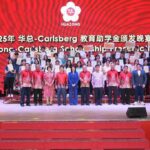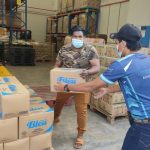It is not an exaggeration to say that the COVID-19 pandemic has paralysed many business sectors. People’s mobility and productivity have been greatly affected due to the numerous restrictions imposed by international health organisations and various countries’ governments. Nonetheless, it has been a hectic time for the pharmaceutical, healthcare, and wellness industry as the pandemic situation demands the sector to bring about their research, solutions, and innovations to the global stage faster than expected.
Diving in-depth on how companies in this industry have been pushing to evolve and stay afloat amid the situation, Isentia uncovered the relevant digital and social media analytics data across prominent Southeast Asia’s markets – Singapore, Malaysia, Indonesia, The Philippines, Thailand and Vietnam. Here are key highlights in our studies toward the pharmaceutical, healthcare, and wellness industry landscape as the new year begins.
Vaccine Remains Top Priority
Typically, it would take years for vaccines to be tested for effectiveness and necessitates additional production time. However, some companies had reached the clinical trial stage of development within one year of the pandemic. The governments across Southeast Asia and the digital publics had also heightened their messaging on the COVID-19 vaccines priority as we close 2020 and open the doors of 2021.
During our study, we found a high volume of coverage on vaccines jointly developed by Pfizer and BioNTech, mainly regarding its 90 per cent effectiveness in preventing COVID-19 infections in ongoing Phase 3 trials. Simultaneously, although it went to the same phase, Johnson & Johnson temporarily paused its COVID-19 vaccine candidate clinical trials due to an unexplained illness in its study participants. In several markets, namely Vietnam, Singapore, Malaysia and The Philippines, the conversations also covered the vaccination priority list.
Pharmaceutical Companies Collaborate to Better Treat Patients
Thanks to the pandemic-driven economies and priorities, a shift towards a more regionally integrated pharmaceutical industry has happened across the markets. From global, regional and domestic collaborations to partnerships and even business acquisition, the initiatives carried out between companies accelerated vaccine discovery and diminished obstacles in research development, distribution, and licensing to mass-produce the vaccines.
One example is COVIFOR, one of the leading products in treating the COVID-19 patients, imported by PT Amarox Global Pharma (Amarox) in Indonesia from Hetero India. Its local distributor, PT Kalbe Farma
Tbk (Kalbe), has gone hand-in-hand with Amarox in adjusting the market price for COVIFOR (Remdesivir).
The two companies have committed to support the government’s objective and seek to reach more patients recovery by reducing its cost. Meanwhile, in the Philippines, GlaxoSmithKline partnered with Vir Biotechnology to expand their COVID-19 antibody treatment experiment, after the initial trial on a group of volunteers did not raise any safety concerns.
Pfizer’s Vaccine as a Trending Topic in Digital Conversations
The expectations for the availability of COVID-19 vaccine have been sustained in an increasing level of interest after Pfizer Inc. announced its vaccine, which jointly developed with BioNTech, to be 90 per cent effective in preventing COVID-19 infections in ongoing Phase 3 trials. The announcement had triggered huge publications in digital journalism across six markets in Southeast Asia, as 4 out of the six markets landed Pfizer in the top rank based on publication volume, namely Singapore, Malaysia, Vietnam, and the Philippines.
“The encouraging news of Pfizer being 90 percent effective in preventing COVID-19 infections has boosted confidence in the economic recovery of the Singapore market. The government’s strategy to not depend on any single source for COVID-19 vaccines has also led to a discussion on social media to compare the vaccines developed by different pharmaceutical brands,” Jenna Wang, Isentia Senior Insights Manager Singapore, added.
On the other hand, although it may not have topped in Indonesia and Thailand, the brand still made its way to the top five, making it a focal point in the brand’s position in the region. Additionally, topics on the Australian Government who signed two deals to buy 40 million doses of COVID-19 vaccines from Novavax and 10 million from Pfizer and BioNTech also contributed to the publication coverage.
Local Pharmaceutical Corporations Scored Achievements Amid the Pandemic
Despite the industry’s current priority, several large local pharmaceutical companies maintained their competitiveness by recording achievements amid the pandemic. Indonesia’s traditional medicine companies, PT Industri Jamu and Pharmaceuticals Sido Muncul Tbk (SIDO) or Sido Muncul, still recorded a positive performance in the third quarter of 2020, mainly from its sales revenue of herbal medicine and supplements segment. The increase in revenue resulted in the company’s net profit growth at 10.78 per cent to IDR640.80 billion, from IDR578.44 billion in the third quarter of 2019.
“Surprisingly, the pandemic has also bolstered the demand for herbal medicines, which is believed to maintain health and protect from the COVID-19 virus. Furthermore, the herbal medicines industry is projected to experience the rapid growth triggered by the pandemic,” Yudha Prawira, Isentia Insights Manager Indonesia, explained.
Dexa Group through PT Dexa Medica won the 2020 Innovative Industry Award from the Ministry of Research and Technology and Indonesia’s National Research and Innovation Agency due to its commitment to developing Original Indonesian Modern Medicine. While in Vietnam, Domesco Medical Export JSC made it into 50 best-listed companies in Vietnam 2020 by Forbes Vietnam. To view the full report and analysis, click here.

Click here to view the full brand rankings

















